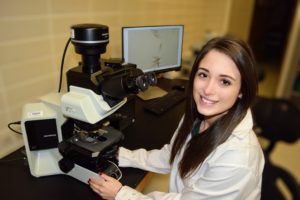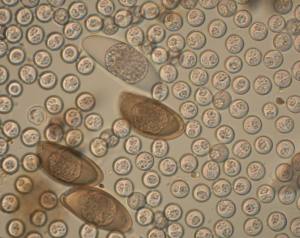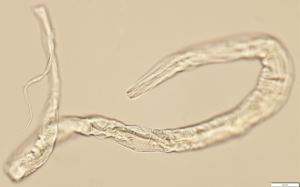During our first semester “Agents of Disease” class, we were encouraged to use our own pet’s fecal samples when learning how to perform fecal floats (a routine veterinary test used to diagnose internal parasites). As a student interested in exotic animal medicine, I brought a sample from my own pet crested gecko.
I enthusiastically researched all I could find on reptile parasites and was intrigued to learn that there was almost no information available on crested geckos, let alone peer-reviewed research articles.
 Since crested geckos are relatively new to the pet trade, it was understandable that not much data had been collected on them. However, I wasn’t satisfied with the little information I found, and as any good researcher would have it, I decided to conduct my own study to improve our medical understanding of the species.
Since crested geckos are relatively new to the pet trade, it was understandable that not much data had been collected on them. However, I wasn’t satisfied with the little information I found, and as any good researcher would have it, I decided to conduct my own study to improve our medical understanding of the species.
I immediately considered all of the research opportunities possible and shared my thoughts with Dr. Sara Lawhon, the course coordinator for our “Agents of Disease” class.
I had the idea to test fecal samples from a variety of lizards at the largest reptile show in Texas, and Dr. Lawhon enthusiastically supported the idea. I had absolutely no idea where to begin, but with her guidance, we were able to develop a plan for collecting data.

Although Dr. Lawhon was undoubtedly very busy during the semester, there was no hesitation when she agreed to take time out of her weekend to help me analyze gecko fecal samples.
She specializes in bacteria and had nothing to gain by helping with my parasitology project, yet she spent hours assisting with data collection, research, and development, just to foster a love of research in one of her students.
As I collected more and more data from various reptile shows across the state, Dr. Lawhon introduced me to Dr. Guilherme Verocai, director of the Veterinary Parasitology Diagnostic Laboratory in the college’s Department of Veterinary Pathobiology (VTPB), and his team, including Joe Luksovsky, MSc.

With his lab’s help, I was able to fine-tune my project and expand it to include a variety of exotic reptile and amphibian species. To date, I’ve tested almost 300 fecal samples from 60 different species, ranging from the tiniest pygmy leaf chameleon to the largest gecko in the world, the leachianus gecko.
At this moment, I’m currently writing two, first-author papers from the data I collected, which will undoubtedly help me with my goal to become board certified in exotic animal medicine.
I know for a fact that I would have never come this far without my incredibly supportive mentors, Dr. Lawhon and Dr. Verocai, who are helping me turn my simple idea into actual published papers.
